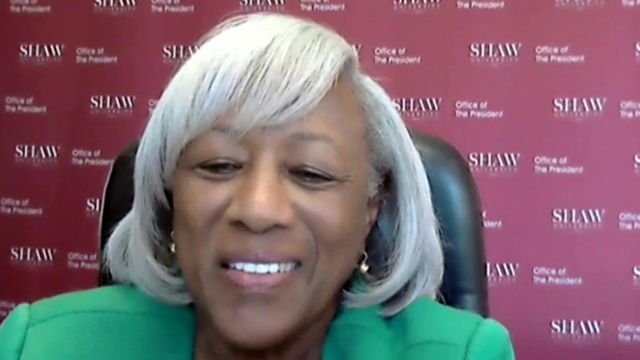Hannah-Jones declines UNC-Chapel Hill tenure, will teach instead at HBCU
Days after University of North Carolina at Chapel Hill trustees voted to give her a tenured faculty position, Pulitzer Prize-winning journalist Nikole Hannah-Jones said Tuesday she was declining the position because of the protracted fight over tenure.
Instead, Hannah-Jones has taken the tenured position of Knight Chair in Race and Journalism at Howard University in Washington, D.C.
"This is my alma mater. I love the university. I wanted to give back," she said in an interview on CBS This Morning. "It was embarrassing to be the first to be denied tenure. It was embarrassing, and I didn’t want this to become a public scandal because I was the first and only Black person to be denied tenure."
The UNC-Chapel Hill alumna and New York Times reporter had been hired as the Knight Chair in Race and Investigative Journalism at the Hussman School of Journalism and Media in Chapel Hill. But at least one trustee expressed doubts about her academic qualifications for a permanent faculty position, so the board delayed voting on her tenure application for months, despite recommendations from Hussman School and university administrators. She was offered a five-year contract instead.
Hannah-Jones' supporters alleged that the delayed vote was due to backlash against the 1619 Project, which focused on slavery's lasting impact on America, and the tenure issue became a national cause célèbre this spring. UNC-Chapel Hill faculty, students and alumni used protests, newspaper ads and social media to demand the Board of Trustees vote on her tenure, and journalists nationwide blasted the university for its handling of the situation.
Hannah-Jones herself threatened to file a discrimination lawsuit against the university, and her attorneys told university officials she wouldn't teach at UNC-Chapel Hill without tenure.
"It’s pretty clear that my tenure was not taken up because of political opposition, because of my discriminatory views and, I believe, my race and my gender," she said in the CBS interview. "It is clear that I was credentialed enough to teach journalism to 18-year-old olds at UNC. I don’t think anyone can say there was any other reason other than the nature of my work – and that’s illegal discrimination."
UNC-Chapel Hill faculty members agreed with her take on the situation.
"While disappointed, we are not surprised," dozens of Hussman School faculty and staff wrote in an online post. "The appalling treatment of one of our nation’s most-decorated journalists by her own alma mater was humiliating, inappropriate and unjust. We will be frank: It was racist."
The Carolina Black Caucus said Hannah-Jones' treatment was emblematic of daily difficulties faced by Black faculty, staff and students on campus.
"The disrespect of Ms. Hannah-Jones is only an extension of the same overt racism and mistreatment of Black students, faculty, staff and community members for many years at Carolina," the group said in a statement. "Black students, staff and faculty are struggling with what has become a battleground for UNC's Black community, trying to navigate the political and social calculus of 'The Carolina Way.'"
Hannah-Jones said the controversy just wore on her over recent weeks, and she decided it was time to move on.
"Since the second grade, when I was started being bused to white schools, I spent my entire life proving I belonged in elite, white spaces that were not built for Black people," she said in the CBS interview. "I got a lot of clarity through my experience with UNC, and I just decided I didn’t want that anymore."
Instead, she will teach at Howard, a historically Black school, along with fellow award-winning journalist Ta-Nehisi Coates, a Howard alumnus.
"It is my pleasure to welcome to Howard two of today’s most respected and influential journalists,” Howard President Dr. Wayne Frederick said in a statement. “At such a critical time for race relations in our country, it is vital that we understand the role of journalism in steering our national conversation and social progress. Not only must our newsrooms reflect the communities where they are reporting, but we need to infuse the profession with diverse talent. We are thrilled that they will bring their insights and research to what is already a world-class, highly accomplished team of professors."
In addition to her tenured teaching position, Hannah-Jones will found the Center for Journalism and Democracy, which will focus on training and supporting aspiring journalists in acquiring investigative skills and historical and analytical expertise. Howard officials said they hope the center will be able to work across multiple historically Black colleges and universities that offer journalism degrees and concentrations.
The Knight Foundation, the John D. and Catherine T. MacArthur Foundation – it earlier provided a "genius grant" to Hannah-Jones for her 1619 Project work – the Ford Foundation and an anonymous donor joined together to provide $20 million to Howard for the effort.
"One of my few regrets in life is that I didn’t go to Howard as an undergraduate, and I’ve long wanted to be a part of the Howard family," Hannah-Jones told CBS. "It’s just so clear that this is the right thing for me to do at this moment."
As for UNC-Chapel Hill, she tweeted that she is "still a #tarheel" and will support the efforts of Black faculty and students there.
"I fought the battle that I wanted to fight. I deserve to be treated equally and have a vote on my tenure. I won that battle," she told CBS. "But my job is not to heal to heal UNC. That’s the job of the people in charge of this situation in the first place."
"I’m a human being. I didn’t ask for this. I just wanted to give back to the place that gave me so much," she continued. "I was so excited to have the opportunity to engage with the students the way the professors engaged with me. This has been one of the most difficult periods of my life, which is why I’ve been really silent about it."
After the interview aired, Hannah-Jones released a statement through the NAACP Legal Defense and Educational Fund that was more critical of UNC-Chapel Hill.
"Why would I want to teach at a university whose top leadership chose to remain silent, to refuse transparency, to fail to publicly advocate that I be treated like every other Knight Chair before me? Or for a university overseen by a board that would so callously put politics over what is best for the university that we all love?" she said in the statement. "These times demand courage, and those who have held the most power in this situation have exhibited the least of it."
Hannah-Jones said that, to "redeem" themselves, the Board of Trustees and administrators need to apologize publicly to student protesters, boost recruitment of and support for Black faculty, make the tenure process more transparent and involve more people in the process of appointing members of the Board of Trustees and the UNC System Board of Governors.
“I have never asked for special treatment. I did not seek it here. All I asked was to be judged by my credentials and treated fairly and equally," she said in her statement. "At some point, when you have proven yourself and fought your way into institutions that were not built for you, when you’ve proven you can compete and excel at the highest level, you have to decide that you are done forcing yourself in."












